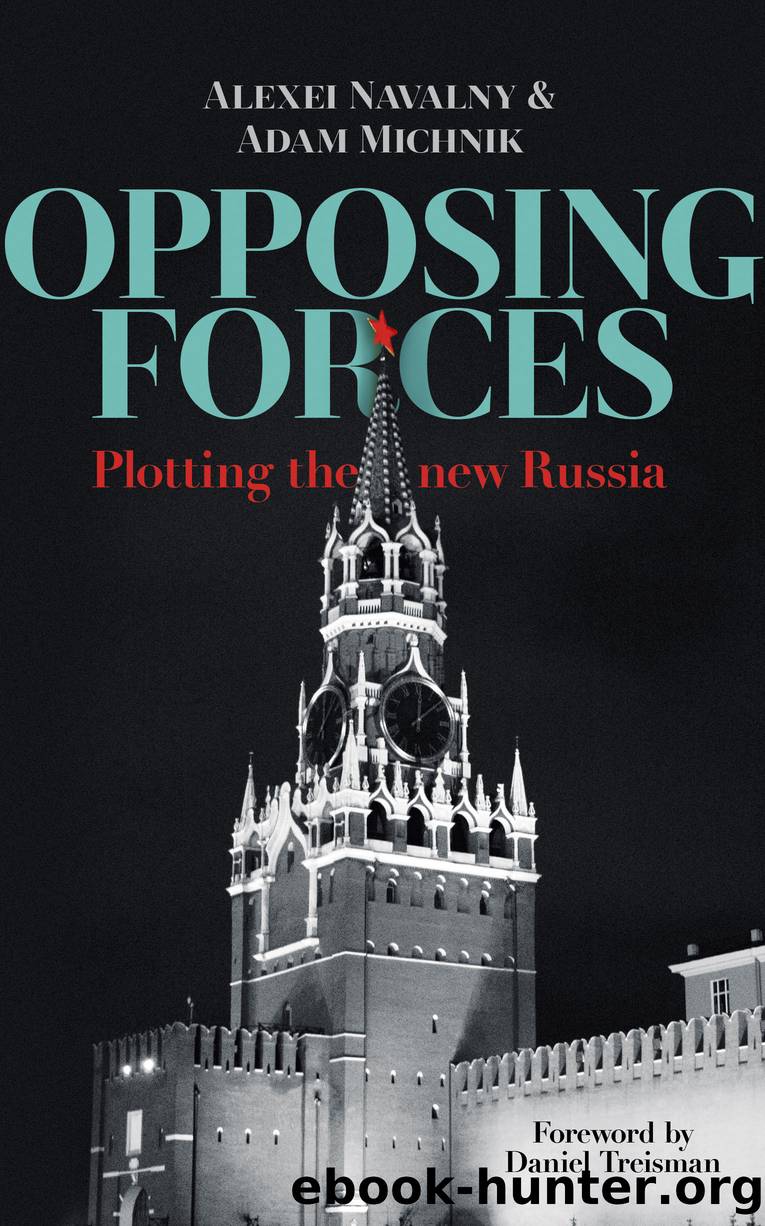Opposing Forces: Plotting the new Russia by Alexei Navalny & Adam Michnik

Author:Alexei Navalny & Adam Michnik [Navalny, Alexei & Michnik, Adam]
Language: eng
Format: epub, mobi, azw3
Publisher: Egret Press
Published: 2017-05-14T18:30:00+00:00
10
The Path to Europe
Navalny Together with Václav Havel, youâre regarded as the co-originator of the idea of a âreturn to Europe.â Could you tell me about this in a little more detail?87
Michnik We knew we needed to get away from the Soviet Union â the further away the better. And if thatâs impossible in a geographical sense, you need to make it happen on a cultural level. We were well aware a distinction had to be made between Soviet and Russian culture. Real Russian culture inspired many of us in our anti-Soviet endeavours; for example, it was Jerzy Giedroyc â a Pole rather than an American or a Frenchman â who first published the work of Sinyavsky and Daniel.
There were exceptions, of course. Milan Kundera believed Russian culture to be alien to Europe, and had a very negative attitude to Dostoevsky, for example â hence his famous polemic with Joseph Brodsky.88 In political terms, I agree with Kundera, who believed that the Soviet Union had taken Eastern Europe hostage, but, culturally speaking, I fully side with Brodsky.
When this idea of a âreturnâ was being formulated in the 1970s and 1980s, we naturally didnât know whatâd happen next, but we realised that, should some critical juncture arrive, weâd need to know how to behave. We could see that the European Community was a guarantor of democratic order, human rights, freedom of speech, an uncensored media environment, open borders, and so forth. And, in order to conform to its norms, it was necessary to renounce Polish messianism and national chauvinism. After all, European values entail maintaining good relations with your neighbours and with national minorities. The return to Europe was a return to a normal government, to democracy, to a tolerant political society, to the rule of law. Europe was a refuge from our domestic hell. Many of us were afraid of âsovereign democracyâ in the Putinist sense of the term. In 1968, I saw anti-Semitism gaining momentum under the influence of propaganda. And I was afraid of a hysterical chauvinist Polish horde.
I know that Russiaâs currently debating whether to strike an article from the Constitution that gives priority to the norms of international law.
Navalny For the Putin regime, this issue89 is an entirely practical one. Heâs constantly losing cases in the European Court of Human Rights (ECHR). He therefore needs to make it so the Court canât overrule Russian decisions, hence his periodic warnings that Russia may withdraw from the ECHRâs jurisdiction. Iâve won cases in the European Court myself, as have the Yukos shareholders. Russiaâs ranked first in the world in terms of the number of complaints filed with the court. An interesting situation is developing: tens of thousands of people across the country regard the ECHR as the only place where they can get justice. My position on this issue is therefore unequivocal â international law should prevail over national legislation. We were the ones who agreed to and signed these conventions.
Michnik Spot on. In Poland, of course, we
Download
Opposing Forces: Plotting the new Russia by Alexei Navalny & Adam Michnik.mobi
Opposing Forces: Plotting the new Russia by Alexei Navalny & Adam Michnik.azw3
This site does not store any files on its server. We only index and link to content provided by other sites. Please contact the content providers to delete copyright contents if any and email us, we'll remove relevant links or contents immediately.
| Anarchism | Communism & Socialism |
| Conservatism & Liberalism | Democracy |
| Fascism | Libertarianism |
| Nationalism | Radicalism |
| Utopian |
The Secret History by Donna Tartt(19092)
The Social Justice Warrior Handbook by Lisa De Pasquale(12191)
Thirteen Reasons Why by Jay Asher(8912)
This Is How You Lose Her by Junot Diaz(6889)
Weapons of Math Destruction by Cathy O'Neil(6281)
Zero to One by Peter Thiel(5802)
Beartown by Fredrik Backman(5756)
The Myth of the Strong Leader by Archie Brown(5509)
The Fire Next Time by James Baldwin(5447)
How Democracies Die by Steven Levitsky & Daniel Ziblatt(5219)
Promise Me, Dad by Joe Biden(5154)
Stone's Rules by Roger Stone(5088)
A Higher Loyalty: Truth, Lies, and Leadership by James Comey(4964)
100 Deadly Skills by Clint Emerson(4926)
Rise and Kill First by Ronen Bergman(4790)
Secrecy World by Jake Bernstein(4753)
The David Icke Guide to the Global Conspiracy (and how to end it) by David Icke(4720)
The Farm by Tom Rob Smith(4514)
The Doomsday Machine by Daniel Ellsberg(4490)
